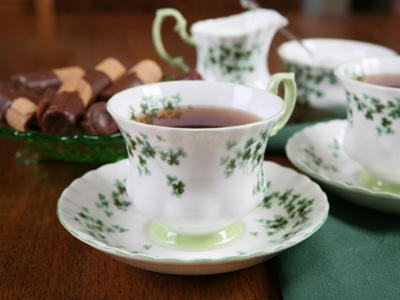
Ask the AI Tutor
Need help with Properties of Materials? Ask our AI Tutor!
AI Tutor - Lucy
Connecting with Tutor...
Please wait while we establish connection

China is strong, waterproof and a good thermal insulator making it a good material for a teacup.
Properties of Materials
Materials have different properties, like being hard, soft, strong, or flexible. In KS2 Science, pupils learn how these properties affect how materials are used.
1 .
What is the opposite of waterproof?
Absorbent
Flexible
Smooth
Opaque
Absorbent materials will soak up liquids whilst waterproof materials will not
2 .
What is the opposite of elasticity?
Stretchiness
Brittleness
Flexibility
Hardness
Something that is very hard and will break rather than bend is described as 'brittle'
3 .
What do we call a material which is not at all bendy?
An insulator
Rigid
Magnetic
Flexible
The same material can be flexible or rigid - a copper kettle would be rigid, while copper wiring is very flexible
4 .
What does 'property' mean when discussing materials?
A material's possessions, such as money and land
The qualities of a particular material
The copyright on a particular material
The objects which are made from a specific material
A material's properties might include hardness, flexibility, strength, shininess, softness, etc.
5 .
Why is copper used for electrical wiring?
Because it is light
Because it is flexible
Because it is a good electrical conductor
All of the above
There are lots of reasons we use copper in our electric wires rather than other materials
6 .
If light cannot pass through a material, which property does that material have?
It is opaque
It is translucent
It is transparent
It is magnetic
Translucent materials may be coloured but you can still see dim shapes through them, like stained glass. Transparent materials are completely see-through, like plain glass
7 .
Which of these materials shows great elasticity?
Sand
Oak
Rubber
Concrete
Elasticity is a measure of how well a material returns to its original shape and size after being stretched or compressed
8 .
Plasticine can be easily moulded or squashed into different shapes. What do we call this property?
Transparency
Conductivity
Density
Malleability
If a material is malleable, its shape can be changed easily
9 .
Which properties of china make it a good material for a teacup?
It is brittle and permeable and a good electrical insulator
It is shiny and transluscent and a good thermal conductor
It is strong and waterproof and a good thermal insulator
It is dense and opaque and a good electrical conductor
If china were a good thermal conductor, you would seriously burn your hands by holding a hot cup of tea
10 .
A real 50p coin is heavier than a toy plastic 50p coin. Materials that are heavier than objects of the same size are more what?
More solid
More magnetic
More light
More dense
The mass of an object compared to its size is described as its density
**Unlimited Quizzes Await You! 🚀**
Hey there, quiz champ! 🌟 You've already tackled today's free questions.
Ready for more?
Ready for more?
🔓 Unlock UNLIMITED Quizzes and challenge yourself every day. But that's
not all...
not all...
🔥 As a Subscriber you can join our thrilling "Daily Streak" against other
quizzers. Try to win a coveted spot on our Hall of Fame Page.
quizzers. Try to win a coveted spot on our Hall of Fame Page.
Don't miss out! Join us now and keep the fun rolling. 🎉
**Unlimited Quizzes Await You! 🚀**
Hey there, quiz champ! 🌟 You've already tackled today's free questions. Ready for more?
🔓 Unlock UNLIMITED Quizzes and challenge yourself every day. But that's not all...
🔥 As a Subscriber you can join our thrilling "Daily Streak" against other quizzers. Try to win a coveted spot on our Hall of Fame Page.
Don't miss out! Join us now and keep the fun rolling. 🎉






